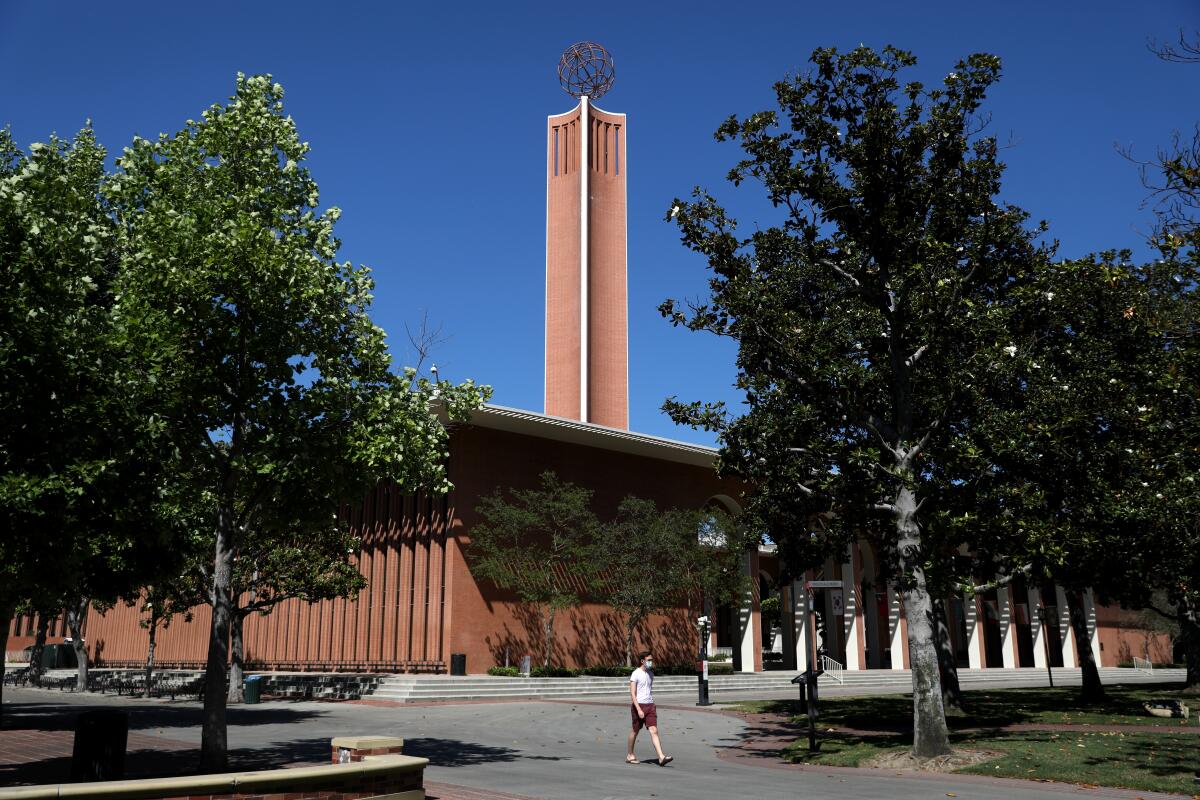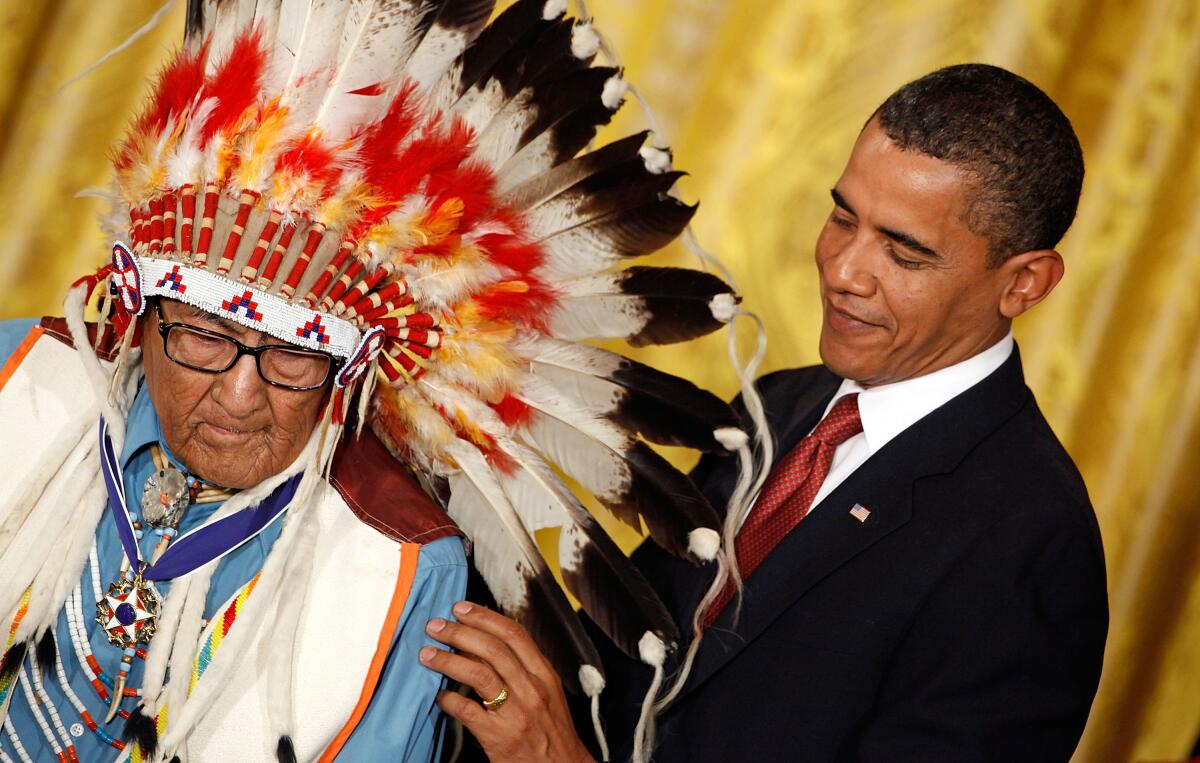A USC building stripped of eugenicist’s name will instead honor a Native American alumnus

One of the most prominent buildings at USC — stripped last year of the name of a leading eugenicist and former university president — will instead honor Joseph Medicine Crow, a Native American alumnus who authored influential works about Indigenous history and culture, served in the U.S. Army during World War II and was awarded the Medal of Freedom, the nation’s highest civilian recognition.
In a move to reconcile with a racist chapter in its history, USC banished the name of Rufus B. von KleinSmid from the Center for International and Public Affairs in the heart of campus. Von KleinSmid held a leadership role in the California eugenics movement.

The university is planning a dedication ceremony in the spring to finalize the transition. In addition to the renaming, USC will offer scholarships for Native American students starting next fall, as a way to further Medicine Crow’s legacy, said USC President Carol L. Folt.
Students urged the university to remove von KleinSmid’s name after the campus community began confronting his involvement with the Human Betterment Foundation, a Pasadena-based eugenics group that supported a 1909 California law that authorized the forced sterilization of those deemed “unfit.” Von KleinSmid himself is said to have believed that people with “defects” should be sterilized.
As the university’s fifth president from 1921 to 1947, von KleinSmid led USC through an expansion that lifted the school to prestige. But his stance on sterilization was “at direct odds” with the university’s mission of inclusion, Folt said when the university announced the removal. A bust of von KleinSmid was also removed from campus after a unanimous vote from the board of trustees’ executive committee.
Folt said there was broad consensus to honor an alum who contributed greatly to society and would inspire students.
“We wanted to make a very different statement than the name that had been there previously, and we wanted to recognize an alum, a person that has really had a big impact in his community and in the world,” Folt said. “We thought that every student that walked into that building and learned a bit about [Medicine Crow] is going to feel a bit prouder and a bit stronger about their own convictions and their own potential.”
Universities across the nation have in recent years removed the names of campus figures after calls from alumni and students about their controversial or racist legacies. UC Berkeley, UC Hastings College of the Law and CalTech are among those that have stripped buildings or institutions of their titles.
To rename the building, the university put together the Center for International and Public Affairs Naming Committee, consisting of staff, faculty, students and alumni, to identify an alum who reflected the university’s values. After compiling more than 200 names, the committee unanimously agreed Medicine Crow was the right person to honor — and the university received the support of his family.
For Native American students and alumni, the decision is meaningful to a group that is often underrepresented in media and academia.
Mato Standing Soldier, a member of the Oglala Lakota tribe of the Pine Ridge Reservation in South Dakota, graduated from USC in 2020. As a student, it became clear over the years that von KleinSmid’s role in supporting the eugenics movement needed to be addressed, he said.
As president of the Native American Student Assembly, he was a part of conversations to ensure the university was standing for students in the community. The naming for Medicine Crow shows Native students that a path in higher education is a space they too can occupy, he noted.
“On a lot of these predominantly white institutions, Native kids can feel very silenced, and very underrepresented and very marginalized,” Standing Soldier said. “Seeing a name that is unapologetically Native can go a really long way.”
Raegan Kirby, a USC junior and a member of the executive board of the Native American Student Assembly, said she viewed the naming as an example of cultural appreciation and shows “how the university is taking the step of appreciation over appropriation.” She added that for prospective Native students, it might give them “a little bit of peace” knowing they are represented at the school.
Medicine Crow, born in 1913 on the Crow Reservation in Montana, served as the last tribal war chief of the Apsaalooké (Crow) Nation. He graduated from USC in 1939 with a master’s degree in anthropology, the first from his tribe to earn a master’s. He was on his way to earning a doctorate when World War II began. While serving, Medicine Crow captured 50 horses from a Nazi camp and engaged in hand-to-hand combat with a German soldier, whom he spared. USC later gave him an honorary doctorate degree.
In 2009, former President Obama awarded Medicine Crow with the Presidential Medal of Freedom. At the White House ceremony, Obama said Medicine Crow’s life “reflects not only the warrior spirit of the Crow people, but America’s highest ideals.”
He died in April 2016 at the age of 102.
Ron Medicine Crow, his son, said the family was grateful that the university is honoring his father, who used to recount his days as a student at USC and how he became friends with players on the football team. His father decided to attend USC after learning from his uncle that they offered scholarships for Native Americans, he recalled. When his father and mother got married, they traveled to Los Angeles and stopped by USC to see the campus.
“We are very pleased and honored that USC would do this as a memorial and a tribute to Dad,” he said, adding that he was looking forward to visiting Los Angeles for the dedication ceremony and “retrace my dad’s footsteps walking the grounds of USC campus.”
More to Read
Start your day right
Sign up for Essential California for news, features and recommendations from the L.A. Times and beyond in your inbox six days a week.
You may occasionally receive promotional content from the Los Angeles Times.







